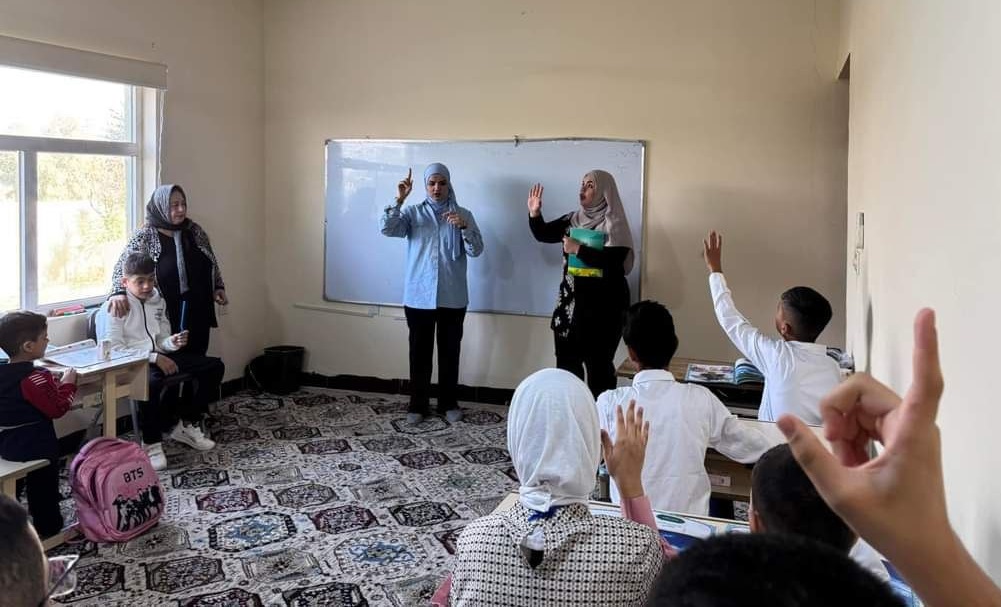Asia Asaad is filled with great joy as she touches the embossed alphabet written on a piece of paper and reads its content.
Asia, a blind girl, had only dreamed of studying and learning until two years ago.
"I learned Braille at the institute along with other subjects. I did not know this method, but now I am proficient at it, enabling me to read," Asaad, a fifth-grade student at a special institute for the blind and visually impaired, told KirkukNow.
The institute was opened two years ago and is the first educational center for the blind in Tuz Khurmatu district in Salah al-Din Province. The subjects taught at the institute include behavior, mathematics, the Quran, social studies, English, Arabic, and computer.
"The lessons are not difficult for me, but rather easy because the teachers make things easy for us... I am very happy to be back in school," said Asaad. She has two other siblings, one of whom is blind and the other visually impaired. "I play outside every day after school with my colleagues at the institute. I no longer feel bored."
The institute for the blind and visually impaired operates from Saturday to Thursday. Most of the institute's curricula are written in Braille, specifically for the blind. The institute accepts students from the district center and all its sub-districts and villages.
The blind are characterized by their ability to quickly receive information and have a strong sense of things
Amin Najim, a teacher at the institute for the blind in Tuz Khurmatu, told KirkukNow that "teaching is not difficult for us. We have all received training on how to deal with the blind, be patient, and provide assistance to them. Learning abilities vary among children, but in general, the blind are characterized by their ability to quickly receive information and have a strong sense of things."
Najim expressed regret that some families do not prioritize their children’s education, saying, "Some believe that the blind do not need to learn," and Amin indicated that there are plans to open a similar institute in Kirkuk.
Salah al-Din, 2024: A class at the Institute for the Visually Impaired in Tuz Khurmatu, Tikrit. Exclusively for (KirkukNow)
The Tuz Khurmatu Institute is part of a larger institute for the blind and visually impaired with nine branches or schools in several Iraqi provinces. The institute is semi-governmental and affiliated with the Ministry of Education.
Ahmed Ibrahim, the director of the Institute for the Blind and Visually Impaired in Tuz Khurmatu, explained to KirkukNow that there is no shortage of teaching staff and they do not use regular books and notebooks, but rather rely on writing for the blind. Their curriculum is the same as that determined by the Ministry of Education.
The Institute for the Blind includes 32 male and female students from the first to the sixth grades of primary school.
“We call it an institute because we teach behavior, education, and upbringing.”
To enroll in the institute, the student must bring a letter of approval from the Ministry of Health stating their vision condition, and Ahmed says they are looking to open intermediate and secondary school classes in the future.
A similar opportunity has arisen in Khanaqin district, but the institute is for the deaf and mute.
Kharman Ismail, the director of the Hiwa Institute for the Deaf and Mute in Khanaqin district of Diyala province, told KirkukNow that "there are a large number of deaf and mute individuals in Khanaqin and the surrounding villages, but the number enrolled in the institute is relatively small because it is new and some families are hesitant to send their children."

The institute opened doors last October, with 25 deaf and mute students registered from all areas of Khanaqin, ranging in age from six to 26 years. The institute, affiliated with the Hiwa Institute for the Deaf and Mute in the Kurdistan Region, includes 16 volunteers, 12 of whom are unemployed.
"It is challenging for us to work voluntarily, so we ask the government to pay attention to us, and we also need other forms of support such as providing educational supplies for the deaf and mute. We rely on projectors and sign language only to enroll the institute's students," according to Ismail.
There are no accurate and official statistics on the number of people with special needs in Iraq, but the Central Statistical Organization indicates that over one million families have members with special needs.




